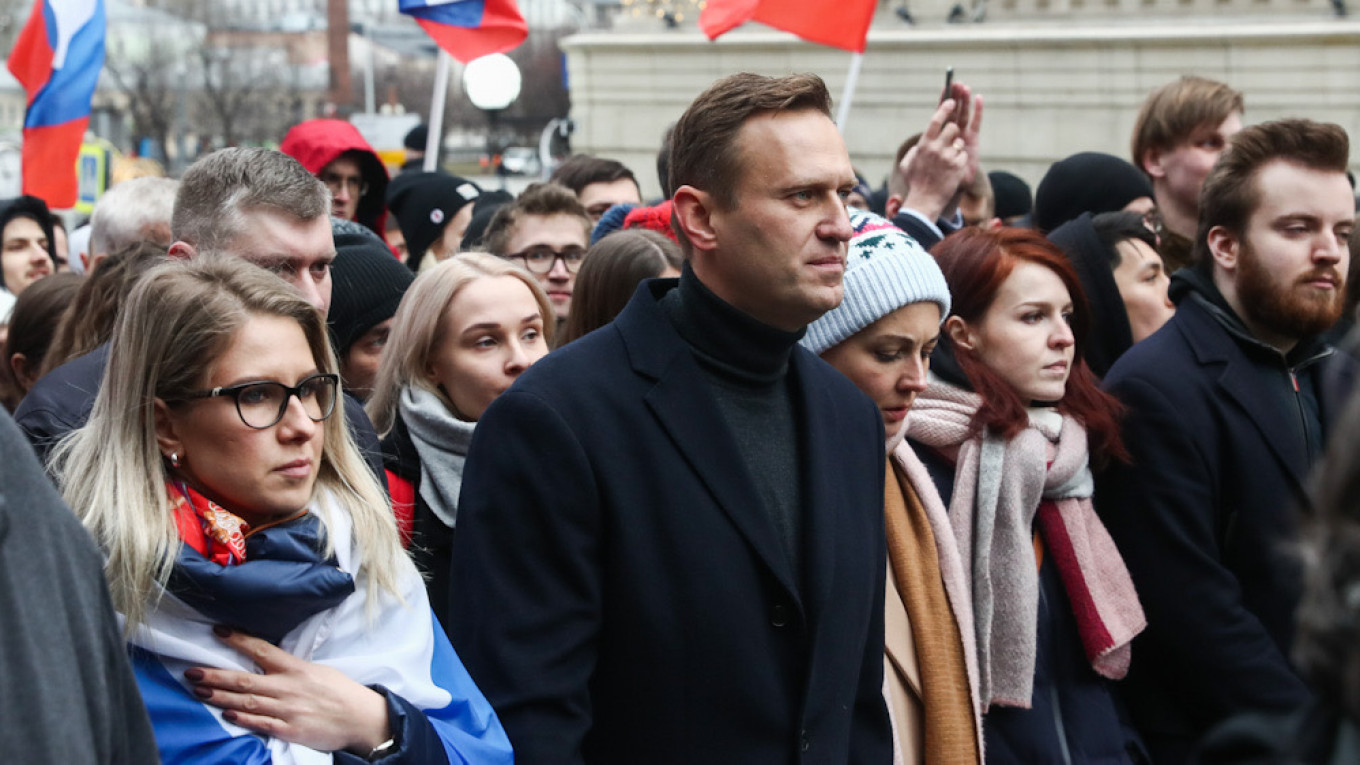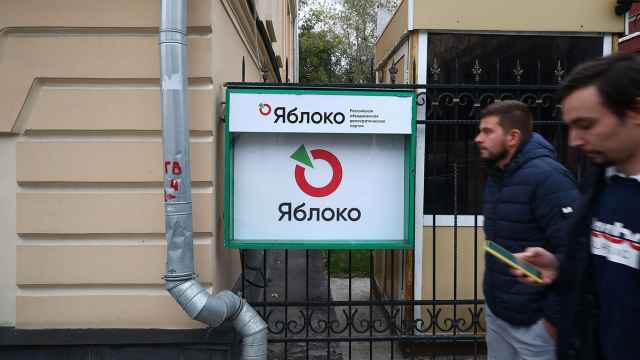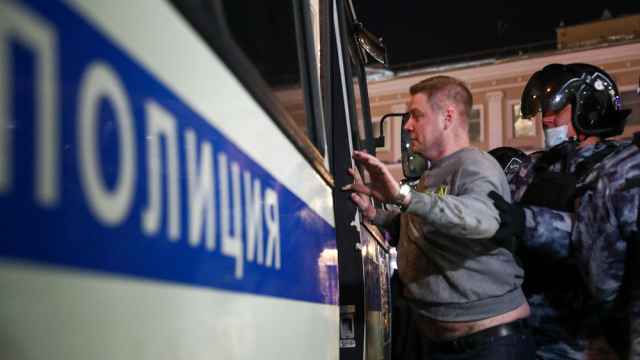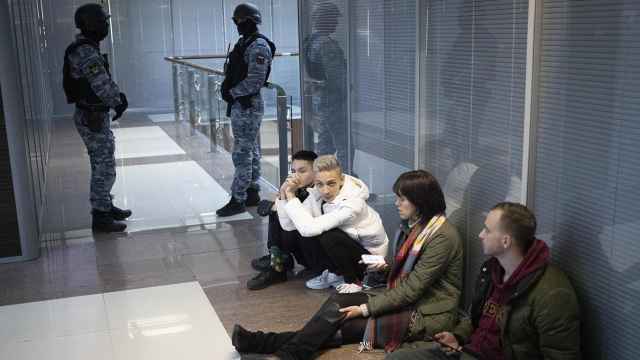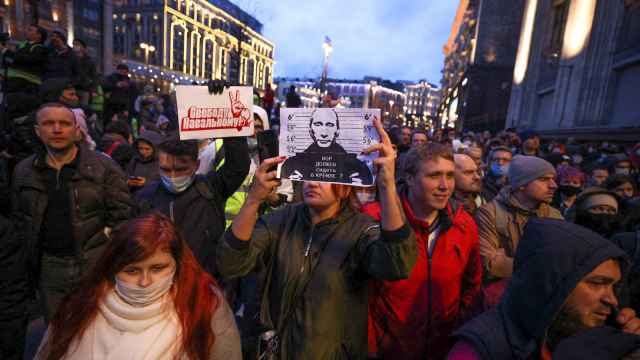Russian authorities widened a crackdown on the country's beleaguered opposition on Wednesday as the legislature advanced a bill that would bar opponents from polls and a court jailed another well-known Kremlin critic.
Russia's opposition says authorities are stepping up a campaign of intimidation against dissenters ahead of a parliamentary vote in September, allegations the Kremlin has rejected.
A court in Moscow is considering whether to designate jailed Kremlin critic Alexei Navalny's political network as an "extremist" organization, which would remove a key challenger to the ruling United Russia party. A decision is expected as early as next week.
Navalny, the most prominent Putin opponent to emerge in recent years, was himself imprisoned in February, after which many of his allies were arrested.
Over the past two days, authorities detained two more opposition critics — Dmitry Gudkov and Andrei Pivovarov, with the latter yanked off a Warsaw-bound plane minutes before takeoff.
On Wednesday, a judge in the southern city of Krasnodar ordered that Pivovarov, the former executive director of Open Russia, a recently disbanded pro-democracy group, be held in pre-trial detention for two months, his allies said.
Pivovarov described the criminal case against him as a form of punishment for his plans to run for parliament.
"When people declare their intentions to take part in polls, that's when the problems start," he said in court.
The 39-year-old faces up to six years in prison for his involvement in an "undesirable" organization.
Pivovarov was detained just days after Open Russia — founded by self-exiled Putin critic Mikhail Khodorkovsky — formally disbanded to shield members from possible prosecution.
The group was designated "undesirable" in Russia in 2017 in line with a law targeting foreign-funded groups accused of political meddling.
Gudkov, a 41-year-old former opposition lawmaker, was detained on Tuesday after police conducted raids on homes of his allies and relatives.
He faces up to five years in prison for allegedly failing to pay a debt under an old lease agreement.
Gudkov is likely to be formally charged Wednesday, said human rights association Agora whose lawyer represents him.
Putin's spokesman Dmitry Peskov told reporters the detentions were a purely legal matter.
"The charges put forward by law enforcement have nothing to do with politics," he said.
'Feeding off our fear'
In a message from prison, Navalny said Pivovarov and Gudkov were "honest" people and urged Russians not to be afraid.
"They are feeding off our fear," Navalny said. "Do not feed them."
Navalny, who barely survived a near fatal poisoning with a Soviet-designed nerve agent last summer, was imprisoned for two-and-a-half-years on old embezzlement charges in February.
Russian authorities had for years tolerated opposition groups including Navalny's political movement but Kremlin critics say authorities are now moving to remove vestiges of dissent as fatigue is growing with Putin's two-decade rule and the coronavirus pandemic exacerbates economic woes.
'Sanitizing' ahead of polls
Also on Wednesday the upper house of parliament overwhelmingly approved a bill that would bar leaders, sponsors and rank-and-file members of "extremist" groups from running in elections.
Leaders of such groups will be forbidden from joining races for five years while members and those who helped finance their work will be banned for three years.
A total of 146 senators backed the bill, while one voted against and one abstained. The legislation will have to be signed by Putin to become law.
It was already backed by the lower house.
Khodorkovsky, a tycoon who himself spent 10 years in a penal colony after falling afoul of Putin during the ex-KGB spy's first years in power — said the Kremlin was not taking any chances ahead of the parliamentary polls.
"The latest moves against opposition activists reflected the authorities' concern about the waning popularity of the United Russia," he said in a statement.
They are "afraid of potential protests that could emerge if they cheat too flagrantly, so they are trying to sanitize the political environment before the election," he said.
Tatyana Stanovaya, the head of the R.Politik analysis firm, echoed the view.
"Every day there will be new bans, new criminal cases and new victims of repression," she said on Telegram.
A Message from The Moscow Times:
Dear readers,
We are facing unprecedented challenges. Russia's Prosecutor General's Office has designated The Moscow Times as an "undesirable" organization, criminalizing our work and putting our staff at risk of prosecution. This follows our earlier unjust labeling as a "foreign agent."
These actions are direct attempts to silence independent journalism in Russia. The authorities claim our work "discredits the decisions of the Russian leadership." We see things differently: we strive to provide accurate, unbiased reporting on Russia.
We, the journalists of The Moscow Times, refuse to be silenced. But to continue our work, we need your help.
Your support, no matter how small, makes a world of difference. If you can, please support us monthly starting from just $2. It's quick to set up, and every contribution makes a significant impact.
By supporting The Moscow Times, you're defending open, independent journalism in the face of repression. Thank you for standing with us.
Remind me later.


